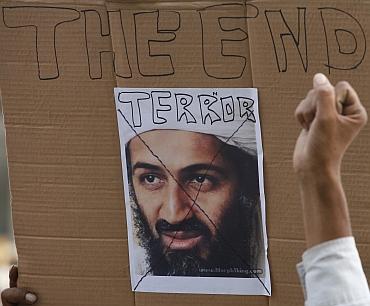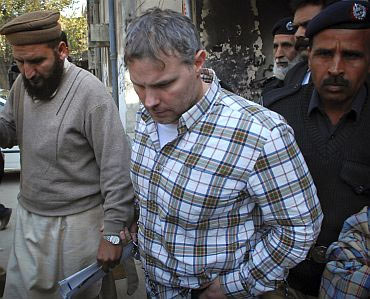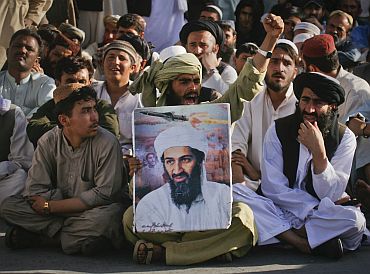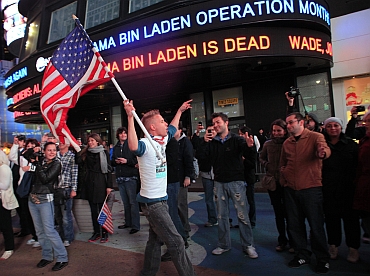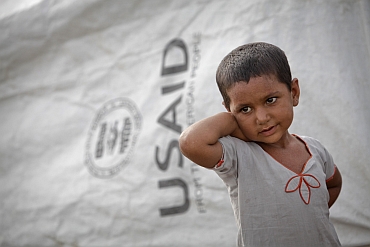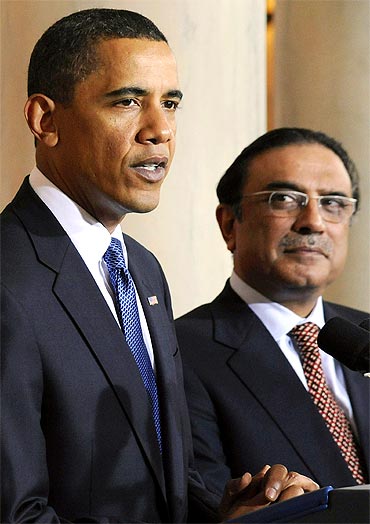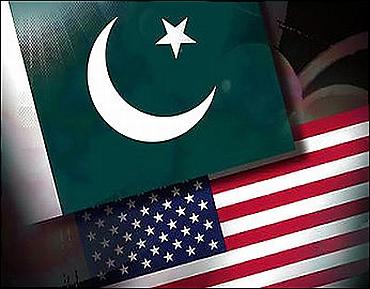 | « Back to article | Print this article |
Why US suspended, didn't terminate aid to Pakistan
The suspension of American aid to Pakistan to the tune of $800 million was triggered by the cancellation of visas for United States special forces working with Pakistan's Frontier Corps in the Federally Administered Tribal Areas. But officials from the Obama administration have acknowledged that it was the crystallisation of several factors that has frustrated Washington in the recent months over Islamabad's actions, or, rather, inactions.
Confirming a New York Times report, White House Chief of Staff William Daley said in a television interview on July 10, "Until we get through these difficulties, we'll hold back some of the money that the American taxpayers have committed to give."
A precursor to such a suspension of aid was first indicated by US Secretary of State Hillary Clinton who had told the Senate Foreign Relations Committee last month that "unless and until we see certain steps taken," the American largesse to Pakistan would be in jeopardy.
Click NEXT to read further...
US frustration grew after Osama was found in Abbotabad
This had consequently led to US Congressional anger and pointed questions to the administration as to why such massive aid to Pakistan was justified when there were all these unanswered questions on Pakistan's 'double-game' and duplicity with regard to the US-led war on terror.
And, all of this was preceded by the Raymond Davis affair, where the Central Intelligence Agency operative had shot two Pakistanis, believed to be Inter-Services Intelligence agents. Pakistan for weeks refused to release him although the US kept maintaining that he had diplomatic immunity.
After the suspension of aid, Pakistan got into a damage control mode of sorts. ISI chief General Shuja Pasha rushed to Washington to meet senior administration officials and acting CIA Director Michael Morrell to alleviate the unravelling partnership.
Move to suspend aid, a cumulative reaction of events starting with Davis affair
Ashley Tellis, former Bush administration official and currently a senior associate at the Carnegie Endowment for International Peace, said, "The US suspension of Pakistani aid was a long time coming."
"It was a cumulative reaction to a series of events beginning with the Raymond Davis affair and ending with the killing of Osama bin Laden. The frustration and anger within the administration towards Pakistan over the last several weeks has been palpable."
Pakistan may still have the last laugh
"There is a larger issue lurking in the background, however, that the Obama administration -- like its predecessor-- is unwilling to confront. Pakistan's duplicity with regards to counter-terrorism cooperation in Afghanistan is a considered strategy that is driven by Rawalpindi's conception of its own interests. Those interests compete with the both Washington's and Kabul's aims in the region. Unless, this fundamental fact is appreciated, slapping Pakistan on the wrist episodically is unlikely to yield any lasting fruit," he added.
Tellis argued that what is needed is a concerted US strategy on defeating Pakistan's efforts at frustrating American and Afghanistan motives in Kabul.
He said, "One way to achieve this is to mount a comprehensive and thorough campaign at coercing Pakistan. This approach would be difficult, painful for both sides, and risky, but it stands a better chance of changing Pakistani behaviour than a token and transitory suspension of aid."
"The other way to achieve American aims is to strengthen Afghanistan directly by committing the resources necessary to obtain military success and by making a long-term commitment to Kabul's security. Unfortunately, Obama has punted on this option, leaving the United States with the worst of both worlds -- an inability to compel Pakistan to change its behaviour, even as a weakening US commitment to Afghanistan only strengthens Rawalpindi's propensity to continue playing the spoiler in the region."
Thus, Tellis predicted that keeping in mind the current trends, Pakistan is likely to have the last laugh because it appears more resolute in achieving its aims in comparison to the United States, a fact that will only pave the way for continuing strife in Afghanistan over the long term.
Suspension of military aid is manifestation of public anger
"Reacting to this dilemma, both governments seem to have adopted two similar sets of strategies. On the one hand, there is public growling by high-level officials against the other country, whose objective seems to be to inform an angry public that the government is defending the national interests against the high-handedness of the other side. So, you have the US joint chief of staff Admiral Mike Mullen saying publicly he believes the Pakistani government sanctioned the recent killing of prominent Pakistani journalist Syed Saleem Shahzad," he said.
The suspension of $800 million in military aid, Andersen said, is yet another manifestation of the public anger -- about one-third of the military aid provided annually to Pakistan. "And then there are the reports, apparently leaked, of the Pakistani military's continuing links to militant groups," he added.
From the Pakistani side, Andersen said, some 100 US military trainers are expelled. People who had provided information on bin Laden's location are picked up for questioning. The military expresses its outrage at the violation of the nation's sovereignty.
The issuance of official visas for US officials has been slowed. Pakistani Defence Minister Chaudhry Ahmed Mukhtar warned that his government might withdraw troops from tribal regions bordering Afghanistan as a response to the suspension of US military aid.
'Suspended US aid will be restored after decent interval'
Andersen said, "In both cases, the purpose is to defuse tensions and work out ways for the two intelligence agencies to work in ways that help each side."
"Much of the $800 million suspension -- and note, it was not called a 'termination' -- was for the various suspended training activities managed by US forces. Of course, the $300 million suspended element used to pay Pakistani troops on the western frontier fighting terrorists is clearly meant to send a signal that the US expects a greater Pakistani commitment to fighting terrorists and will probably be restored after a decent interval."
Andersen, just before his retirement from the diplomatic service, for years was the chief of the State Department's Intelligence and Research Bureau. "The apparently leaked information about militant evacuation of four bomb-making facilities after the US informed Pakistani intelligence about the location is probably meant to send a signal that we are watching closely and have the intelligence capabilities of doing so. And that we consequently know when the level of cooperation is less than expected," he noted.
"While the powerless Pakistani defence minister beats his chest vigorously on possible retaliatory steps to the suspension of military assistance, various senior Pakistani military figures are quoted as downplaying the suspension, saying the country would continue to fight terrorism because it is in the country's interests to do so," he added.'Pak wants Afghan Taliban to influence Kabul after US drawdown'
He said, "The US wants to defeat the Afghan militants so that we can draw down military presence and bring stability to the region. Pakistan wants to use the Afghan Taliban, who have safe havens in Pakistan, to influence what happens in Afghanistan after the US-NATO presence is reduced."
Andersen warned that "civil war could break out again as happened in the 1990s and all the neighbours want to influence the outcome."
'US-Pak equally dependent on each other in war on terror'
She believed that the suspension of the $800 military aid may have jolted the Pakistani leaders into recognising that the US will no longer settle for the status quo in relations.
Curtis said, "Perhaps Pakistani officials have finally sat down and gamed out the consequences of allowing the US-Pakistan relationship to further deteriorate. In that scenario, even as the US pulls ground troops out of Afghanistan, it will almost certainly remain strongly engaged in the region and supportive of anti-Taliban elements in Afghanistan."
"Ultimately, does Pakistan want to be faced with a hostile government on its border in Kabul that has the support of both the US and India? Additionally, can Pakistan function effectively without the US-endorsed $11 billion International Monetary Fund programme it accepted in 2008 because of its faltering economy," she asked.
According to Curtis, the fact is that the US and Pakistan are equally dependent on one another, especially in the fight against terrorists in the tribal areas that threaten the security of both nations.
'Enough room to recalibrate Pak-US ties'
Curtis argued that trying to make the US a scapegoat for the uncomfortable situation will only deepen Pakistan's problems.
She said, "By cutting military aid, the US is signaling it is willing to risk a certain amount of deterioration in relations. At the same time, the US is leaving the door open for the possibility of better relations in the future and for eventually reinstating the aid if merited by Pakistani action."
But, Curtis noted, "Even with the cuts, the US is still providing large amounts of aid, and it is unlikely that the relationship would implode overnight. There is a great deal of room to recalibrate the relationship without allowing it to rupture."

